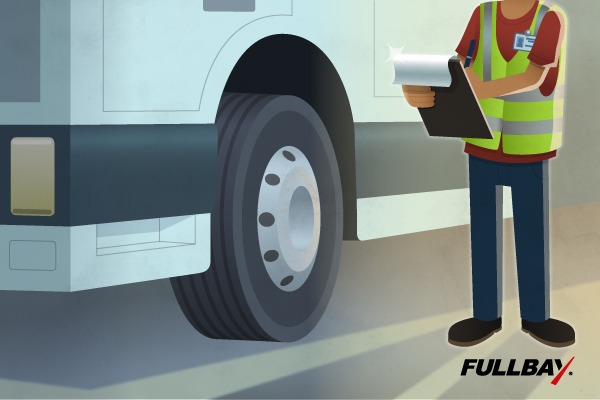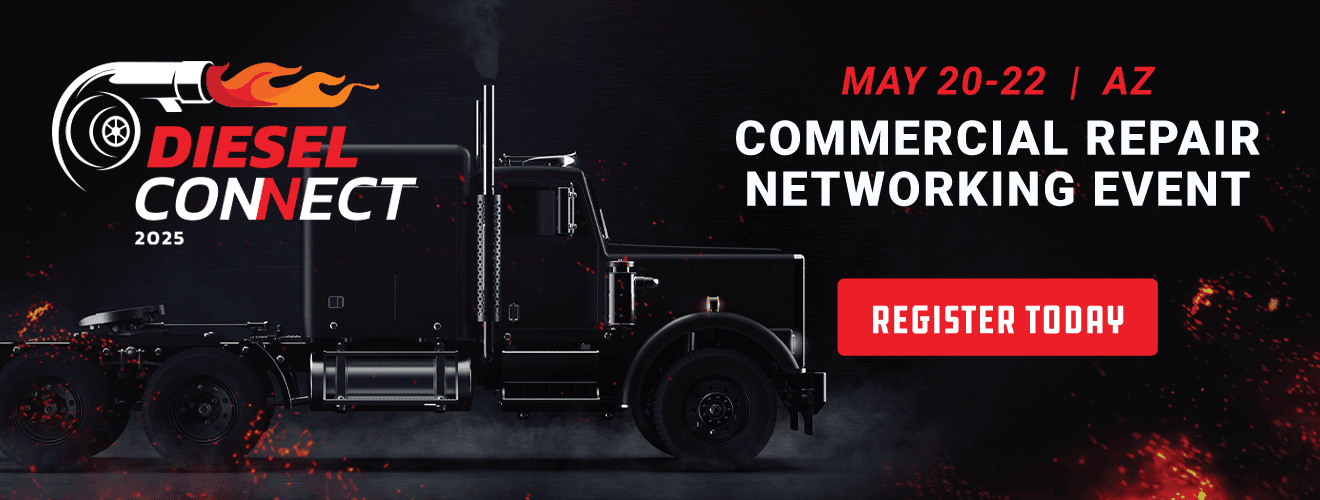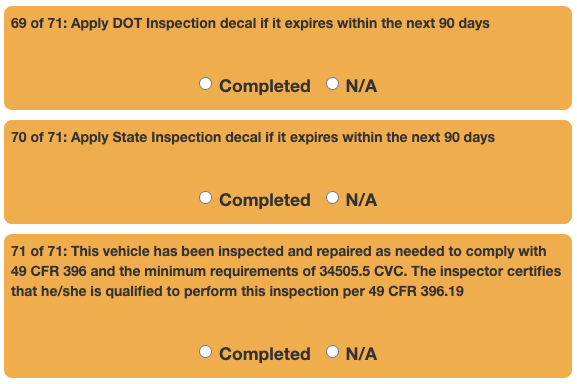The Good, The Bad, and the DOT Inspection

What is a DOT inspection?
Fullbay, you’re saying, is this a trick question?
No, we’re not talking about finding all the red candies when you open a new box of Dots (although we think it’s pretty clear that red Dots are the best Dots).

We’ve gathered up some of the most pressing questions folks new to the industry have about DOT inspections and compiled some answers for you.
Ready? Let’s go.
What is a DOT inspection?
A DOT inspection is a sort of check-up for all commercial vehicles that weigh over 10,000 pounds. They’re to make sure the vehicle (and sometimes its driver) are in good operating condition and are safe to be out on the road.
But wait, there’s more.
A DOT inspection is an in-depth yearly requirement, and you can usually get one at your local shop, provided they have the proper certifications. But you can still get pulled over by a DOT inspector to make sure everything is in good shape.
Who performs DOT inspections?
DOT inspections are performed by the Department of Transportation, but you’ll most often be dealing with someone from one of these three groups:
- Federal Motor Carrier Safety Administration (FMCSA), which oversees and funds all inspections.
- State troopers, who often perform the inspections.
- Commercial Vehicle Safety Alliance (CVSA), which created the inspection programs we’re going to discuss in detail below.
Where do DOT inspections happen?
If your vehicle needs its yearly inspection, you can drop it at the certified location of your choice.
If the truck is on the road and pulled over, though – well, that can happen pretty much anywhere. Like many things in the industry, enforcement will vary by state, but an inspection may be triggered when a truck pulls into a scale and data about its history (or its carrier history) pops up on a screen. Alternatively, a cop cruising along may see a potential violation and opt to pull the driver over for inspection.
What happens during a DOT inspection?
DOT inspections are broken down into six categories, which drivers should always be ready for any of these:
Categories of DOT inspections
- North American Standard Inspection: Also called the Level One Inspection. This is the Big Kahuna; the granddaddy of all inspections. If you’re driving, the inspector will want to review your daily log & hours of service; your medical card (and any waivers); the driver & vehicle inspection report; and your license. They’ll also be scanning the cab for any drugs and alcohol. They’ll also be examining your vehicle to make sure it’s in excellent operating condition. Headlamps, the fuel system, exhaust, steering, and many other parts will be checked. If you like, we’ve put together a Level One Vehicle Checklist for you:
- Level One Checklist
- Brakes
- Brake lights
- Coupling devices
- Exhaust
- Frame
- Fuel system
- Headlights
- Loading safety
- Projecting load lamps
- Steering
- Suspension
- Taillights
- Tires
- Trailer
- Turn signals
- Wheels
- Wipers
- Level One Checklist
- Walkaround/Driver Inspection: See all that stuff up there? The same thing happens here, except anything that requires the inspector to go under the vehicle is omitted.
- Driver-Only Inspection: The Level Three inspection is more about the driver than the truck. Your inspector will be looking closely at your documentation, including everything we mentioned in the Level One as well as any incident history and seatbelt usage.
- Special Inspections: Your inspector is only looking at a specific part of your vehicle.
- Vehicle-Only Inspection: This is basically a Level One inspection, but the driver is not present.
- Enhanced NAS Inspection: You don’t need to worry about this unless you’re shipping radioactive materials. If you are, however, your inspector will be checking out your cargo.
How do I pass a DOT inspection?
In theory, passing a DOT inspection is easy: Just keep your vehicle and paperwork in good order. Check out your truck before, during, and after each trip to make sure everything is in good working order. Staying on top of preventive maintenance can stop a lot of problems that will trigger a DOT problem before they even start.
To further prepare for a DOT inspection, keep your truck and equipment clean and ready for official eyeballs. Make sure your cargo is properly loaded, and that the name of your company and USDOT number are printed somewhere easily seen.
There are three results you can receive from a DOT inspection:
- No violations: Hooray, nothing wrong with your truck! Move along.
- Violations, Non-Out Of Service: Some things need fixing, but as long as you handle them ASAP you should be OK. Think of this as a fix-it ticket.
- Violations, Out Of Service: OK, you probably shouldn’t have been driving this truck. And actually, if you receive this “grade,” you won’t be driving at all. Park the vehicle and get in touch with your carrier – you need to get things fixed yesterday.
What are some common DOT violations?
What kind of violations could you be looking at? Here’s a few:
Truck violations
-Leaking fuel/oil/transmission fluid/etc.
-Poorly loaded freight
-Lights broken/inoperable
-No record of annual inspection
Driver violations
-Expired medical card (or no medical card)
-No seatbelt
-Violating HOS laws
-Expired license
What happens when I pass my DOT inspection?
You get a box of Dots. Congratulations!
Actually, you’ll receive a CVSA decal, also known as the DOT inspection sticker. This stands for Commercial Vehicle Safety Alliance, and it generally tells those who look at it that you’ve passed your inspection. They are color-coded by the quarter in which they’re issued (green for January-March; yellow for April-June; Orange for July-September; White for October-December). They’re also good for three months.
Once those decals expire, you’re fair game to get checked again.
What’s the CVSA road check?
The summer road check event, or DOTapalooza, stretches across three days every summer. During it, state troopers and DOT officers step up their efforts to pull over and inspect vehicles. The idea behind it is to promote safe vehicle operation at all times, not just when you’re expecting an inspection.
The next CVSA road check event is set for May.
Does the DOT inspection cost anything?
If you are pulled over, you won’t need to pay anything on the spot. But if you receive unfavorable results (whether they’re non-serious violations or bad enough to get you slapped with the dreaded Out Of Service), it can damage your overall rating – oh, and you’ll be on the hook for the necessary repairs, which can get pricey.
If you get your inspection done at your local shop, you’ll pay whatever fees they require. The fees will be based on what you’re driving and what level of inspection you need.
Can I do my own DOT inspection?
Short answer: Maybe.
Long answer: Probably don’t try it.
The in-between of it is, if a carrier has someone who is certified to perform DOT inspections, then that individual can handle said inspection.
Can the average owner-operator perform the inspection on their own vehicle? No.
Repair Shops & DOT inspections
Coincidentally, if you’re a repair ship looking around for extra work, think about obtaining the necessary certifications to provide annual DOT inspections. This isn’t just another potential stream of income; it also makes you a more valuable partner for your customers. You’ll be saving them a lot of time and money they might otherwise pour into correcting DOT violations. You can even track upcoming annual DOT inspections in Fullbay!
“Fullbay,” you’re saying, “that sounds like a lot of work.”
It is. But guess what? You can track DOT inspections in Fullbay!

Track your customer’s PMs and DOT Inspections in Fullbay
When an inspection comes due, you can notify a customer that they need to undergo their inspection – otherwise they’re…well…they’re illegally driving their trucks. You can schedule an on-site visit to perform the inspection (if you’ve got a mobile arm) or they can just bring the truck in. The app walks you through every test and procedure necessary for the inspection; you check them off as you go. Once you’re done, magic happens – you can provide the fabled DOT decal.
We hope you’ve enjoyed this little primer on DOT inspections, how to prepare for them, and how Fullbay can help you score a little extra business. Now, if you’ll excuse us, we’re going to get back to counting out the red candies.

